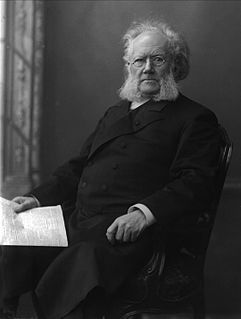
Georg Wilhelm Friedrich Hegel was a German philosopher and an important figure of German idealism. He achieved wide recognition in his day and—while primarily influential within the continental tradition of philosophy—has become increasingly influential in the analytic tradition as well. Although Hegel remains a divisive figure, his canonical stature within Western philosophy is universally recognized.
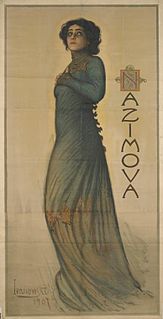
Hedda Gabler is a play written by Norwegian playwright Henrik Ibsen. Ibsen was present at the world premiere, which took place on 31 January 1891 at the Residenztheater in Munich. It is recognized as a classic of realism, nineteenth century theatre, and world drama. The title character, Hedda, is considered one of the great dramatic roles in theatre.
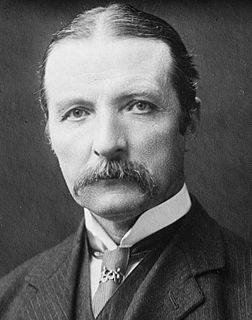
William Archer was a Scottish writer and theatre critic, based, for most of his career, in London. He was an early advocate of the plays of Henrik Ibsen, and was an early friend and supporter of Bernard Shaw.

The problem play is a form of drama that emerged during the 19th century as part of the wider movement of realism in the arts, especially following the innovations of Henrik Ibsen. It deals with contentious social issues through debates between the characters on stage, who typically represent conflicting points of view within a realistic social context. Critic Chris Baldick writes that the genre emerged "from the ferment of the 1890s... for the most part inspired by the example of Ibsen's realistic stage representations of serious familial and social conflicts." He summarises it as follows:
Rejecting the frivolity of intricately plotted romantic intrigues in the nineteenth-century French tradition of the 'well-made play', it favoured instead the form of the 'problem play', which would bring to life some contemporary controversy of public importance—women's rights, unemployment, penal reform, class privilege—in a vivid but responsibly accurate presentation.
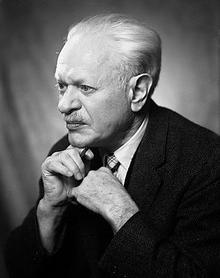
Kenneth Duva Burke was an American literary theorist, as well as poet, essayist, and novelist, who wrote on 20th-century philosophy, aesthetics, criticism, and rhetorical theory. As a literary theorist, Burke was best known for his analyses based on the nature of knowledge. Furthermore, he was one of the first individuals to stray away from more traditional rhetoric and view literature as "symbolic action."
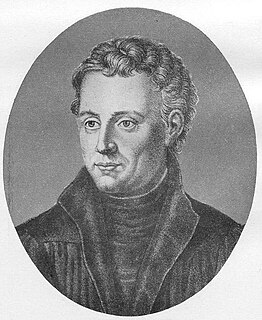
Obscurantism is the practice of deliberately presenting information in an imprecise and recondite manner, often designed to forestall further inquiry and understanding. There are two historical and intellectual denotations of Obscurantism: (1) the deliberate restriction of knowledge—opposition to disseminating knowledge; and, (2) deliberate obscurity—an abstruse style characterized by deliberate vagueness.

Raya Dunayevskaya, born Raya Shpigel, later Rae Spiegel, also known by the pseudonym Freddie Forest, was the American founder of the philosophy of Marxist Humanism in the United States. At one time Leon Trotsky's secretary, she later split with him and ultimately founded the organization News and Letters Committees and was its leader until her death.

The Master Builder is a play by Norwegian playwright Henrik Ibsen.

Love's Comedy is a comedy by Henrik Ibsen. It was first published on 31 December 1862. As a result of being branded an "immoral" work in the press, the Christiania Theatre would not dare to stage it at first. "The play aroused a storm of hostility," Ibsen wrote in its preface three years later, "more violent and more widespread than most books could boast of having evoked in a community the vast majority of whose members commonly regard matters of literature as being of small concern." The only person who approved of it at the time, Ibsen later said, was his wife. He revised the play in 1866, in preparation for its publication "as a Christmas book," as he put it. His decision to make it more appealing to Danish readers by removing many of its specifically Norwegian words has been taken as an early instance of the expression of his contempt for the contemporary Norwegian campaign to purge the language of its foreign influences.

The Moscow Art Theatre is a theatre company in Moscow. It was founded in 1898 by the seminal Russian theatre practitioner Konstantin Stanislavski, together with the playwright and director Vladimir Nemirovich-Danchenko. It was conceived as a venue for naturalistic theatre, in contrast to the melodramas that were Russia's dominant form of theatre at the time. The theatre, the first to regularly put on shows implementing Stanislavski's system, proved hugely influential in the acting world and in the development of modern American theatre and drama.
When We Dead Awaken is the last play written by Norwegian dramatist Henrik Ibsen. Published in December 1899, Ibsen wrote the play between February and November of that year. The first performance was at the Haymarket Theatre in London, a day or two before publication.
Literary realism is part of the realist art movement beginning with mid-nineteenth-century French literature (Stendhal), and Russian literature and extending to the late nineteenth and early twentieth century. Literary realism attempts to represent familiar things as they are. Realist authors chose to depict everyday and banal activities and experiences, instead of using a romanticized or similarly stylized presentation.
James Walter McFarlane was a scholar of European literature, author of The Oxford Ibsen, and founding Dean of the School of European Studies at University of East Anglia which included Scandinavian studies.
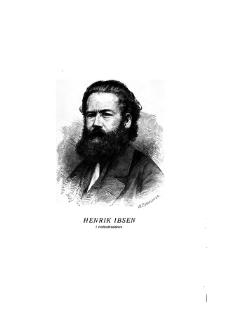
The Oxford Ibsen is a book series containing the most comprehensive English translations of the playwright Henrik Ibsen's collected works, edited by James Walter McFarlane and published between 1960 and 1977. It is an important edition as the releases of Ibsen's plays usually are translated into third languages through The Oxford Ibsen, rather than from the original Norwegian source texts. It also contains some drafts and preparations, and each play has a foreword that informs about first performances on stage, interpretation and reception. The Oxford series is still missing some of Ibsen's articles, reviews, speeches, correspondence, and poetry.

Steven F. Sage is a scholar and former American diplomat who has written on ancient China and on 20th-century Europe. His major published works are Ancient Sichuan and the Unification of China (1992) and Ibsen and Hitler (2006). He is currently working on books on the Holocaust in Bulgaria and on the building of the Reichsautobahn.
Michael Elliott, OBE (1931–1984) was an English theatre and television director.

Vasily Ivanovich Kachalov, PAU, was one of Russia's most renowned actors. He worked closely and often with Konstantin Stanislavski. He led the so-called Kachalov Group within the Moscow Art Theatre. It was Kachalov who played Hamlet in the Symbolist production of 1911.
Adrian Johnston is an American philosopher. He is a Professor in the Department of Philosophy at the University of New Mexico at Albuquerque and a faculty member at the Emory Psychoanalytic Institute in Atlanta.
